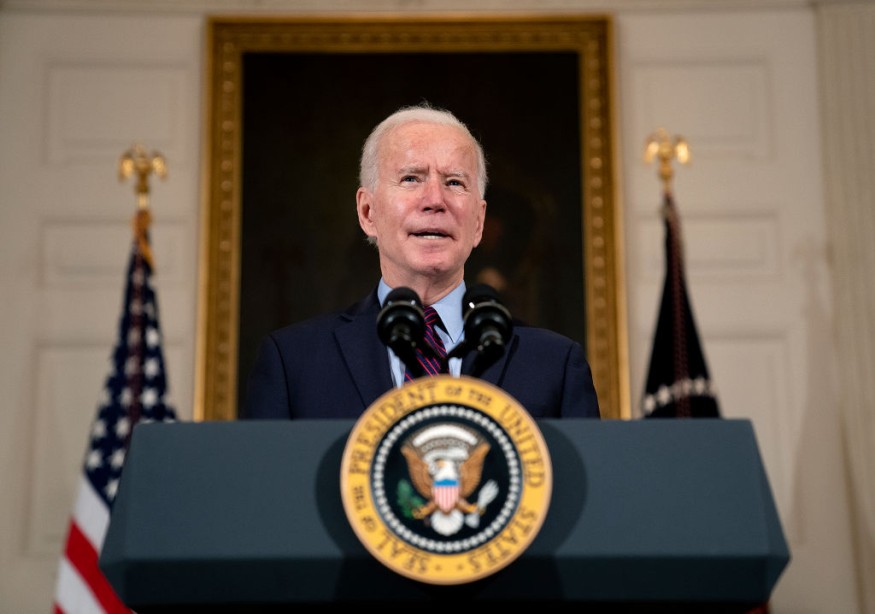Biden Says Next Stimulus Checks Will Be $1,400: Here's What You Can Expect

President Joe Biden reiterated his commitment on Friday to send $1,400 stimulus checks to millions of Americans to support the recovering economy and help those affected by the pandemic.
"That's what the American people were promised," Biden said during an update on the economy. However, he said the payments could be better directed at those who most need the money, which could exclude some individuals and families who previously received them.
According to a CNBC report, Biden said he is not cutting the size of the checks, and "they're going to be $1,400." The president also said that the payments need to be targeted so people "making $300,000 do not get any windfall."
The additional direct payments are included in Biden's $1.9 trillion coronavirus relief plan. The $1,400 sums would be given to individuals, as well as child and adult dependents, based on an income threshold.
This week, Senate Republicans proposed a $618 billion that have suggested reducing the next round of direct payments to $1,000 for individuals earning less than $40,000 or joint filers earning less than $80,000 with payments phasing out once the income reaches $50,000 to $100,000, respectively, according to a Forbes report.
Coupled with $600 payments approved by former president Donald Trump last December, the $1,400 checks would help Biden make good on his campaign promise of providing $2,000 in assistance.
Related story : Biden Signs New Executive Orders on Food Stamps, Stimulus Checks, and Federal Minimum Wage
Who Would Be Getting the Stimulus Checks and When It Would Be Sent?
Individuals making up to $75,000 yearly and married couples who earn up to $150,000 would see full payments. The Internal Revenue Service (IRS) uses the federal tax system to decide everything - from how much money you'll get in your stimulus checks based on your adjusted gross income (AGI) and how quickly it can deliver your next payment.
According to a CNET report, it would be faster if you do your taxes soon and set up direct deposit with the IRS.
The House voted on party lines Friday to approve a budget proposal that continues setting the stage for Democrats to approve Biden's stimulus package without any Republican votes. The vote outcome was 219-209.
In a letter sent to colleagues, House Speaker Nancy Pelosi said they might finish their work by the end of February. For his part, House Majority Leader Steny Hoyer said that Democrats would try to put the measure to a floor vote during the week of Feb. 22.
If a bill was to pass before the end of February or before March 14, the first direct deposit check could be sent as early as the week of Mar. 8 or the week of Mar. 22.
But remember that stimulus checks for different payment groups may begin to arrive at various times, and it could still take weeks for people in a group like those getting physical checks to all get their funds.
Penn Wharton Budget Model's research released this week showed that 73 percent of the $1,400 checks would go toward savings and provide limited stimulus to the economy.
A study from the University of Illinois, on the other hand, found that about eight million Americans without jobs are not receiving unemployment benefits, which caused the argument for sending more direct payments.
Senate Also Backs Biden's Stimulus
The New York Times reported that the Senate also endorsed Biden's stimulus package on Friday, voting along party lines over unified Republican opposition to approve a budget blueprint that would allow Democrats to implement it without GOP support.
Vice President Kamala Harris cast her first tiebreaking vote. The Senate adopted a budget measure by a vote of 51 to 50. Biden's plan remained intact as Democrats moved forward despite the amendments made.
"We cannot repeat the mistakes of the past. We cannot do too little," Senate Minority Leader Chuck Schumer, a Democrat, said in a report.
Reports said House committees will begin drafting the legislation next week now that both chambers passed the budget bill containing their outlines.
Meanwhile, the U.S. Congressional Budget Office (CBO) said it sees the U.S. economy recovering from the COVID-19 pandemic much more quickly than previously expected, Irish Times reported.
The CBO is a nonpartisan arm of the legislature. According to its economic outlook, the office sees gross domestic product will increase by 1.7 percent annually from 2020-2024.
The increase is a 0.7 percentage point increase from the previous expectation released in July, months before COVID-19 vaccines were shown to be effective and approved for use.
The CBO added that the Federal Reserve's preferred measure of inflation will surge gradually over the next few years and rises above 2.0 percent after 2023.
Subscribe to Latin Post!
Sign up for our free newsletter for the Latest coverage!
© 2025 Latin Post. All rights reserved. Do not reproduce without permission.














